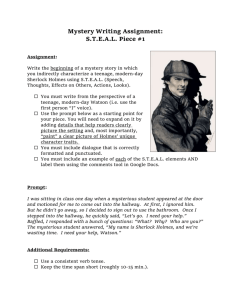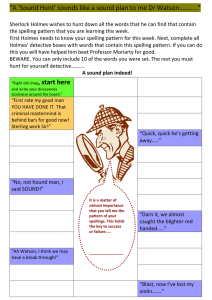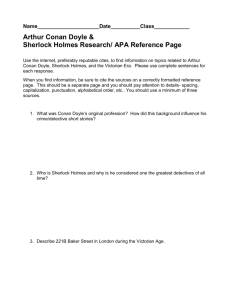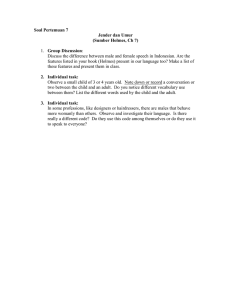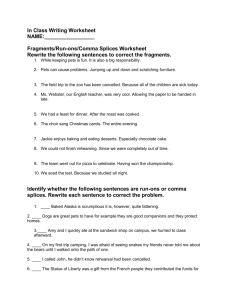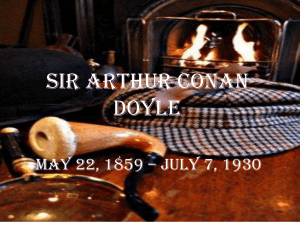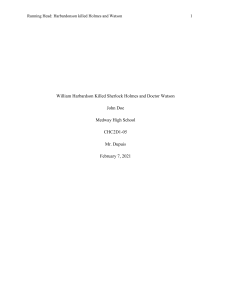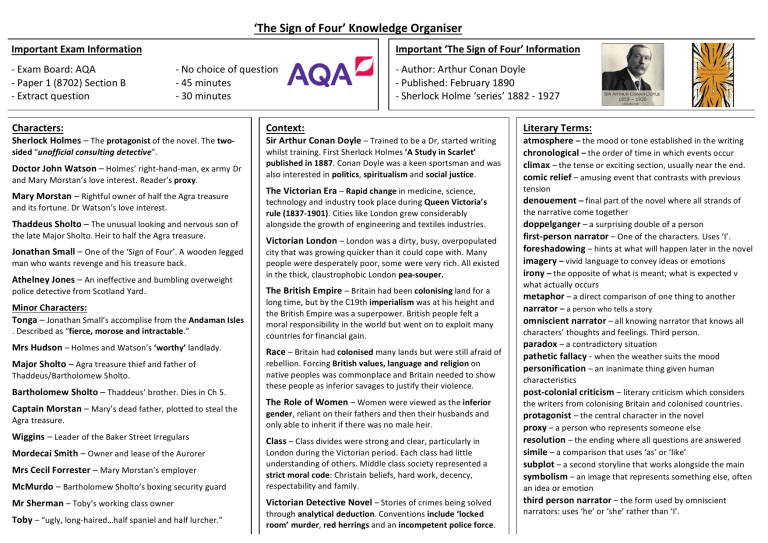
‘The Sign of Four’ Knowledge Organiser Important Exam Information - Exam Board: AQA - Paper 1 (8702) Section B - Extract question - Important ‘The Sign of Four’ Information - No choice of question - 45 minutes - 30 minutes - Author: Arthur Conan Doyle - Published: February 1890 - Sherlock Holme ‘series’ 1882 - 1927 Characters: Context: Literary Terms: Sherlock Holmes – The protagonist of the novel. The two- Sir Arthur Conan Doyle – Trained to be a Dr, started writing sided “unofficial consulting detective”. whilst training. First Sherlock Holmes ‘A Study in Scarlet’ published in 1887. Conan Doyle was a keen sportsman and was also interested in politics, spiritualism and social justice. atmosphere – the mood or tone established in the writing chronological – the order of time in which events occur climax – the tense or exciting section, usually near the end. comic relief – amusing event that contrasts with previous The Victorian Era – Rapid change in medicine, science, tension technology and industry took place during Queen Victoria’s rule (1837-1901). Cities like London grew considerably alongside the growth of engineering and textiles industries. denouement – final part of the novel where all strands of the narrative come together doppelganger – a surprising double of a person first-person narrator – One of the characters. Uses ‘I’. foreshadowing – hints at what will happen later in the novel imagery – vivid language to convey ideas or emotions irony – the opposite of what is meant; what is expected v what actually occurs metaphor – a direct comparison of one thing to another narrator – a person who tells a story omniscient narrator – all knowing narrator that knows all characters’ thoughts and feelings. Third person. paradox – a contradictory situation pathetic fallacy - when the weather suits the mood personification – an inanimate thing given human characteristics post-colonial criticism – literary criticism which considers the writers from colonising Britain and colonised countries. protagonist – the central character in the novel proxy – a person who represents someone else resolution – the ending where all questions are answered simile – a comparison that uses ‘as’ or ‘like’ subplot – a second storyline that works alongside the main symbolism – an image that represents something else, often an idea or emotion third person narrator – the form used by omniscient narrators: uses ‘he’ or ‘she’ rather than ‘I’. Doctor John Watson – Holmes’ right-hand-man, ex army Dr and Mary Morstan’s love interest. Reader’s proxy. Mary Morstan – Rightful owner of half the Agra treasure and its fortune. Dr Watson’s love interest. Thaddeus Sholto – The unusual looking and nervous son of the late Major Sholto. Heir to half the Agra treasure. Jonathan Small – One of the ‘Sign of Four’. A wooden legged man who wants revenge and his treasure back. Athelney Jones – An ineffective and bumbling overweight police detective from Scotland Yard. Minor Characters: Tonga – Jonathan Small’s accomplise from the Andaman Isles . Described as “fierce, morose and intractable.” Mrs Hudson – Holmes and Watson’s ‘worthy’ landlady. Major Sholto – Agra treasure thief and father of Thaddeus/Bartholomew Sholto. Bartholomew Sholto – Thaddeus’ brother. Dies in Ch 5. Captain Morstan – Mary’s dead father, plotted to steal the Agra treasure. Wiggins – Leader of the Baker Street Irregulars Victorian London – London was a dirty, busy, overpopulated city that was growing quicker than it could cope with. Many people were desperately poor, some were very rich. All existed in the thick, claustrophobic London pea-souper. The British Empire – Britain had been colonising land for a long time, but by the C19th imperialism was at his height and the British Empire was a superpower. British people felt a moral responsibility in the world but went on to exploit many countries for financial gain. Race – Britain had colonised many lands but were still afraid of rebellion. Forcing British values, language and religion on native peoples was commonplace and Britain needed to show these people as inferior savages to justify their violence. The Role of Women – Women were viewed as the inferior gender, reliant on their fathers and then their husbands and only able to inherit if there was no male heir. Class – Class divides were strong and clear, particularly in McMurdo – Bartholomew Sholto’s boxing security guard London during the Victorian period. Each class had little understanding of others. Middle class society represented a strict moral code: Christain beliefs, hard work, decency, respectability and family. Mr Sherman – Toby’s working class owner Victorian Detective Novel – Stories of crimes being solved Toby – “ugly, long-haired…half spaniel and half lurcher.” through analytical deduction. Conventions include ‘locked room’ murder, red herrings and an incompetent police force. Mordecai Smith – Owner and lease of the Aurorer Mrs Cecil Forrester – Mary Morstan’s employer Plot Important Quotations Learn quotations, know where in the novel they come, know how Chapter 1. The Science of Deduction - Holmes and Watson are introduced. Holmes shows how he can deduce the owner of a watch. Miss Morstan arrives. Chapter 2. The Statement of the Case- Miss Morstan explains her story – her father mysteriously disappeared and she has been receiving a pearl on the same date every tear for six years. Holmes and Watson agree to go with her to the mysterious meeting at the theatre. Chapter 3. In Quest of a Solution - Miss Morstan shows Holmes a paper she has found in her father’s belongings. They are met at the theatre by a coachman who drives them to a house where an Asian servant opens the door. Chapter 4. The Story of the Bald-Headed Man - They meet Thaddeus Sholto who explains how his father had died and explains why he arranged for the pearls to be delivered to Miss Morstan. They go to see his twin brother Bartholomew. There are many clues in this chapter. Chapter 5. The Tragedy of Pondicherry Lodge - When they get to the house, Holmes and Watson find Bartholomew dead in a locked room. They find a thorn on the dead man. The treasure is missing. Chapter 6. Sherlock Holmes Gives a Demonstration - Sherlock examines the room and deduces that two people were involved. Athelney Jones arrives to take on the case. Holmes asks Watson to collect Toby the dog. Chapter 7. The Episode of the Barrel - Watson takes Toby to Pondicherry Lodge and they use him to try and track the criminals. Holmes explains his theories but Toby leads them to a barrel of creosote. Chapter 8. The Baker Street Irregulars - They pick up the trail and are led to the riverside. Holmes talks to Mrs Smith who is tricked into telling them that the men they are tracking are on a boat called the Aurora with her husband. They return to Baker Street where Holmes employs the Baker Street Irregulars to find the boat. Chapter 9. A Break in the Chain - Watson returns Toby but on his return is told by Mrs. Hudson that she is concerned for Sherlock’s health. Holmes leaves Watson to find the boat. Jones arrives in response to a telegram from Holmes. An ancient sailor arrives, but when he removes his disguise it is Holmes. Holmes explains that he knows where the boat is and they have dinner. Chapter 10. The End of the Islander - After dinner they set off in a police boat to find the criminals. After a long chase, they arrest Small and Tonga is killed. Chapter 11. The Great Agra Treasure - Watson sees Mary Morstan with the treasure chest which is empty. They admit their love for each other. Chapter 12. The Strange Story of Jonathan Small - Small explains his story to Holmes. Watson returns and tells Holmes he will marry Mary Morstan. Holmes reaches for the cocaine bottle. they relate to key themes and issues. ‘Give me problems, give me work’ ‘I abhor the dull routine of existence. I crave for mental exaltation.’ ‘Detection…an exact science…cold and unemotional’ ‘No, no: I never guess’ ‘an automaton – a calculating machine…positively inhuman’ ‘A client…a mere unit, a factor…’ ‘clear-cut, hawk-like features’ ‘What a very attractive woman!’ ‘the monster tentacles which the giant city was throwing out into the country.’ ‘He was…in excellent spirits, a mood which in his case alternated with fits of the blackest depression.’ ‘a bearded, hairy face, with wild cruel eyes and an expression of concentrated malevolence’ ‘its gloom and its deathly silence, struck a chill to the heart.’ ‘our hands instinctively sought each other.’ ‘Holmes bent down…instantly rose again with a sharp intaking of the breath.’ ‘I am weaving my web round Thaddeus. The net begins to close upon him.’ ‘So swift, silent, and furtive were his movements, like those of a trained bloodhound picking out a scent.’ ‘This Agra treasure…an impassable barrier between us’ ‘The chief proof of man’s real greatness lies in his perception of his own smallness.’ ‘dozen dirty and ragged little street Arabs’ ‘They are naturally hideous…fierce…cannibal’ ‘This infernal problem is consuming me.’ ‘You are master of the situation.’ ‘Women are never to be entirely trusted.’ ‘Aurora…going like the devil! ‘savage, distorted creature…that face was enough to give a man a sleepless night’ ‘thick lips writhed back…half-animal fury’ ‘Thank God!’ I ejaculated from my very heart.’ ‘Whoever had lost a treasure, I knew that night I that I had gained one.’ ‘I really cannot congratulate you’ ‘Love is an emotional thing…opposed to that true cold reason which I place above all things.’ ‘There still remains the cocaine-bottle’ Themes and Issues Helpful Terminology - Duality - Englishness and Foreignness - Wealth and class - Crime and Punishment - Victorian Fear - The British Empire and Imperialism - Emotion vs. Rationality - Treasure and Wealth - Love and Friendship - Justice and Evil - Victorian London - Race and the outsider acumen – to make quick, apt decisions affectation – behaviour designed to impress amoral - unconcerned with right or wrong avarice – extreme greed decorum – good taste and decent behaviour dedicated – single-minded loyalty egocentric – thinking of himself enigmatic - mysterious fastidious – careful attention to detail Gothic – genre of dark, mysterious stories inimitable – unable to match malevolent – wishing to do evil to others obstreperous – stubbornly defiant pallid – no colour, suggesting distress ruminate – reflect deeply on something
